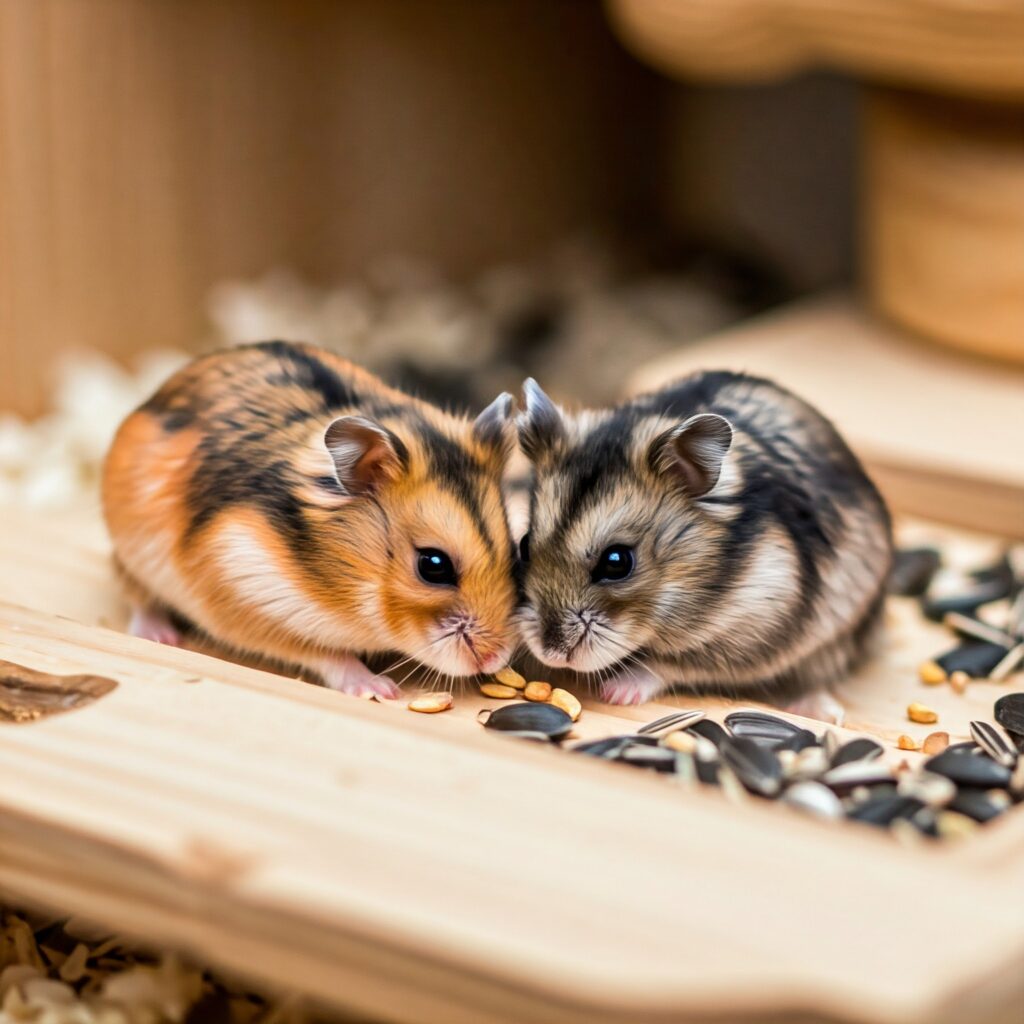Introduction
Rats vs. Hamsters and many other small animals as pets are also well embraced these days because they are cute and take little space. Of course, mere differentiation between the two is crucial when it comes to making a choice between the two. Now let’s discuss the basic differences between Rats vs. Hamsters to find out, what type of pet will suit you best.
Rats vs. Hamsters:
As with all pets, various characteristics associated with Rats vs. Hamsters will play a crucial factor when sacrificing between the two.

- Size and Appearance: Rats are usually longer with tail and thin built whereas hamsters are miniature, spherical creatures and of no tail.
- Lifespan: Rats are comparatively more live-longed than hamsters, for they live for 2- 3 years, whereas hamsters live for 1.5 – 2 years only.
- Temperament: Rats are active during the night and consider themselves social animals and therefore do well with their owners, on the other hand hamsters are nocturnal animals and are popular for being independent animals that do not mix well with other animals nor their owners.
From these discriminations emerges the basis for determining which pet meets or does not meet your expectations.
Rats vs. Hamsters as Pets:
What You Need to Know
Many people regard Rats vs. Hamsters as some kind of unpleasant pests, meanwhile, those are clever and sweet animals.
Advantages of Rats vs. Hamsters as Pets
- Socio Visceral and like to live in pairs or a group of animals.
- Lacks in ease to train since it is not that intelligent.
- They require little effort to maintain a neat appearance and relatively un Requires little effort, time, and money to keep their hair neat and tidy.
Introduction to Social Behavior and Intelligence
Rats vs. Hamsters are very sociable animals and can even respond to their owners. This is thanks to their ability to be trained to do tricks and their good nature makes them a good fit for anyone looking for a fun loving pet.

Housing for Rats vs. Hamsters
Rats vs. Hamsters require a large cage and one that has provisions for the animal to climb on. Two-tiered cages with multiple levels, addition of hideouts and exercise wheels is what best fits these animals.
Rat Care Tips
It may be process to care for a rat but it is important that one must know what a rat needs.
- Hygiene: Its bedding requires change of at least once per week in order to avoid build up of odor and bacteria.
- Exercise: Give them things to play with and play sessions outside the cage because those cages necessarily keep their active brains busy.
- Hamsters as Pets: What You Need to Know
People love to keep hamsters as pets mainly due to their easy to maintain and they are cute.
The Benefits of Rats vs. Hamsters as Pets
- Perfect for small spaces.
- Autonomous and satisfied being a single dweller.
- Cheap and low maintenance.
- Solitary Nature
- Rats vs. Hamsters are social animals while hamsters are solitary ones, which means that people who do not have time for constant endearing of several animals will be suitable for having a hamster.
Ideal Living Conditions
An exposure to fresh air with providing fancy units such as tunnels and exercise wheels is advisable. Hamsters like to dig, so make sure you give them enough depth of substrate.
Hamster Care Tips
Taking care of hamsters is straightforward but requires consistency:
- Feeding: Hamsters believe in pellets seeds or grains, and fresh additions once in a while if any at all.
- Cage Maintenance: To keep the environment clean, wash your surfaces, particularly high-traffic areas, regularly, every day and in detail every week.
- Activities: Play with them and feed them chew toys and change their play things often.
Rats vs. Hamsters: Social Needs and Interaction
Rats vs. Hamsters – the first factor concerns interaction Rats require much more interaction than hamsters.
Rats:
Rats vs. Hamsters are heavily socialized and have lots of social needs, they require human contact.
Hamsters:
Hamsters therefore require less attention from you but can endure touchiness.
If you want a pet, who will be loyal and develop a close connection, rats are preferable.
Maintenance Comparison: Rats vs. Hamsters
From a maintenance perspective, rats vs. hamsters also vary significantly:
- Cost: Both pets are cheap to maintain but rats may need a bigger cage and more on the bedding hence slightly pricey.
- Cleaning Effort: The hamsters are neater animals and cleaning our Rat’s cage you find a lot of droppings.
- Time Commitment: Rats are sociable animals while hamsters are not, they also take longer to interact with than hamsters do.
- Health Considerations
Rats and hamsters both need some attention in order not to face some health problems. - Rats: Suffers from respiratory infections, and tumors.
- Hamsters: Is prone to what is known as wet tail, a stress related disease.
They should always be watched since they can slip back into their old bad habits and should also be taken to a vet for check-up.
Usefulness for Different Life Predictions
Your choice between rats vs. hamsters will depend on your lifestyle:
- Choose Rats If: You want a friendly, obedience trained pet and lots of time to spend with it everyday.
- Choose Hamsters If: You want a pet that does not require much care or attention so that it cannot be interfered with easily.
- Enrichment: Toys, tunnels, hammocks, and items for Correctional Breeding Program (CBP) know keep them mentally and physically busy.
- Temperature Control: Warm temperatures between the range of 65-75°F are favorable for rats.
Contrary to hamsters, rats also should have daily out-of-cage playing, but you should provide them a rat-proofed area where they can move under the supervision.
Housing for Hamsters
Wild hamsters are adapted to living in burrows so they need small enclosures as their homes. Essentials include:
- Deep Bedding: For digging and burrowing purposes, of course.
- Tunnels and Wheels: These are as such useful in entertaining hamsters and keeping them as active as is possible.
- Ventilation: Let their cage breathe or rather have good air circulation.
Although both these animals require a clean environment in which to live in, hamsters need less space than rats which makes them suitable for small spaces.
Comparison Of Behavioral Traits: Rats vs Hamsters
Knowing values differences between rats vs. hamsters makes a better decision possible.
Rats
Rats are friendly creatures, they grace and respond well to social stimuli and are also very clever. It seems that they can become very attached to their people and even learn their names. These pets are friendly if you wish to be companied, and obedient if you wish to train.
Hamsters
Producers are more individualistic than consumers and will establish territory especially when in groups. They are active during the night time most of the times, which makes them not the best pets for most people. Hamsters nicely suit the owners who want a small pet that does not require much communication.
These behavioral differences explain how and why rats fit owners who want an ‘interacting’ pet, while hamsters are most suitable to owners who just want a pet to be on its own.
Comparisons between feeding needs of Rats and Hamsters
Like all animals, they need proper feeding in order to help them live healthy lives to the fullest.
What Rats Eat
Rats require a balanced diet consisting of:
- Pellets: Specific rat’s food that has a high quality and contains less portion size for them to(Strategic Management Eff. 6).
- Fruits and Vegetables: It is good to include foods such as apples, carrots and spinach.
- Protein Sources: Small portions of well-cooked chicken, turkey or eggs.
Rats are known to collect food, so clean their cage frequently to avoid any spoilt food.
What Hamsters Eat
Hamsters have different dietary requirements:
- Seeds and Grains: Small animal blend with commercial hamster food.
- Fresh Produce: Carrots and celery, broccoli flowerets, and apple wedges.
- Occasional Treats: Some form of mealworm or nuts for a desired source of protein.
- Like all animals: Both pets require availability of edible clean fresh water at all times with feeding underlining species appropriate diets.
Which Pet is Easier to Train?
Taking into account their capability to be trained, the rates are far superior to the hamsters. Rewarding the rats through treats or positive words only goes well after you have trained them.
Training Hamsters
The hamsters are rather less manageable owing to their stubbornness. They can mimic simple behaviors such as walking on your hand but if you want to take them further than that then you will find that you can’t really train them.
So if you are aiming at having interactivity in training sessions, then rats are much more fulfilling.
Rats vs Hamsters: rate of bonding
One of the fun part of owning a pet is establishing a relationship with them.
Bonding with Rats
Rats by nature are social animals which means that they do like to interact with humans. I have found that it is easy to coax them into gaining their trust by spending some time with them everyday, speaking softly to them and even feeding them. They know their owners and want affection which makes them feel like they are really owned.
Bonding with Hamsters
Hamsters are shy and need some time for familiarizing themselves with handling. To have them give you an ear, you have to take your time since they slow-moving animals that can be easily frightened, especially when transferred from one place to another.
Bonding process indicates that while rats are better suited for companionship more so in the traditional sense hamsters are good for limited interaction.
Rats vs. Hamsters – Economic Pros and Cons
This is the last consideration to make when choosing between the two; cost.
Expenses for Rats
- Initial Setup: The current price estimate ranges from $100-$200 for a large cage and accessories.
- Ongoing Costs: Food, beddings and once in a while vet fees come to $30—$50 each month.
- Initial Setup: A smaller cage forming the cage setup may cost between $50-$100.
- Ongoing Costs: Less on food and bedding make the monthly costs to stay between twenty to thirty dollars.
- Expenses for Hamsters
- Generally, both animals are cheap, but hamsters could pose more benefits to the owner who is financially unbudgeted.
Final Verdict: Rats vs. Hamsters
So, which of the two animals will fit well into your lifestyle? It all depends as to how much you like her, and whether you are capable of making her needs come true.
- Adopt Rats if you’re looking for a lively, outgoing companion who can lovingly and expectantly stare at you. They are perfect for families and people who want to find a tightly connected animal.
- Select Hamsters if you want a less dependent, easy-to-care-for animal which are attractive to watch, particularly if you have less amount of time or space.
- Basically, both rats and hamsters are great as pets; it depends on which type fits well into your life.
Frequently asked Questions
Which is better to be cared; rats or hamsters?
Hamsters are easier because they are single animals, but if the owner wants to interact with the pet, this is the right choice.
Which pet is better for children: rats or hamsters?
Rats should be for older kids, and hamsters should be for young kids when supervised.
Which is cheaper to maintain; rats or hamsters?
Rats are slightly cheaper to keep than hamsters, but the quality of the friendship received is better.
Rats and hamsters can they share the same cage?
It is not true because they have different social needs, and they may become a threat to each other.
How many years does a rat or hamster live?
Rats are likely to live for 2-3 years and hamsters live for about 1.5- 2 years.
Conclusion
The choice between rats and hamsters boils down whether one will suit you better than the other according to personal preferences and the characteristics of your life experience. Like any other cat species, both are cute, easy to take care of animal with special characteristics. Determine what you can offer, and then select the friend that will be a good fit for your home and you.
















3 thoughts on “Rats vs. Hamsters: Which Pet is Better for Your Lifestyle? in 2025”